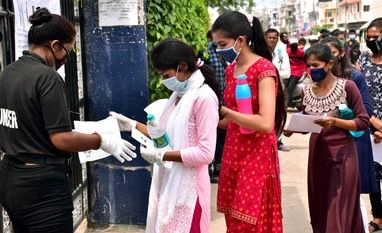379 girls from Delhi government schools crack NEET 2020 amid Covid-19
The NEET was conducted on September 13 amid strict precautions in view of the COVID-19 pandemic
)
Students getting their documents verified outside an exam centre as they arrive to appear for the NEET exam in Jabalpur.
From an electrician's daughter to an elder sibling of five surviving on limited resources, 379 girls from Delhi government schools have cracked the medical entrance exam NEET this year.
Twenty-three girls from a government school in Okhla's Noor Nagar are elated over their feat though some of them plan to appear for the exam again to improve their scores.
"We were expecting that atleast 15 of our students would clear the tests but not these many. Some of the students come from very humble backgrounds, someone is an electrician's daughter, someone has five siblings and has to teach them too besides surviving on limited resources," said vice-principal Mudassir Jahan, Sarvodaya Kanya Vidyalaya, Noor Nagar.
"Some of them plan to appear again to improve their scores because they cannot afford fees of private medical colleges," Jahan said.
Seventeen-year-old Ariba Naeem said, "COVID-19 threw different financial challenges before us. Also I took time to gain confidence that I can perform at par with private school students who have access to all facilities".
Also Read
Tamanna Goel, who studies in Rajkiya Pratibha Vikas Vidyalaya, Sector 11, Rohini, secured 655 of the maximum 720 marks in the National Eligibility cum Entrance Test (NEET).
Twenty-nine girls from Sarvodaya Kanya Vidyalaya, Molar Band and 24 from girl's schools in Yamuna Vihar, are among the students who have cracked the exam.
A total of 569 students of Delhi government schools have passed the National Eligibility cum Entrance Test (NEET) examination, out of which 379 are girls. There are a total of 48 students who have bagged over 500 marks out of 720.
The NEET was conducted on September 13 amid strict precautions in view of the COVID-19 pandemic.
From this year, the admissions to MBBS course in 13 All India Institute of Medical Sciences, Jawaharlal Institute of Postgraduate Medical Education and Research, Puducherry, will also be made through NEET following the amendment in National Medical Commission Act, 2019, passed by Parliament last year.
The test was offered in 11 languages -- English, Hindi, Assamese, Bengali, Gujarati, Kannada, Marathi, Odia, Tamil, Telugu and Urdu -- this year. Based on the initial report, more than 77 per cent aspirants took the test in English, around 12 per cent in Hindi and 11 per cent in other languages.
The exam was earlier postponed twice due to the COVID-19 pandemic and the government decided to go ahead with it, despite opposition by a section, to mitigate any further academic loss.
The National Testing Agency had set in place strict standard operating procedures in view of the pandemic, including measures like reducing the number of candidates per room from the earlier 24 to 12.
(Only the headline and picture of this report may have been reworked by the Business Standard staff; the rest of the content is auto-generated from a syndicated feed.)
More From This Section
Don't miss the most important news and views of the day. Get them on our Telegram channel
First Published: Oct 23 2020 | 7:11 PM IST
